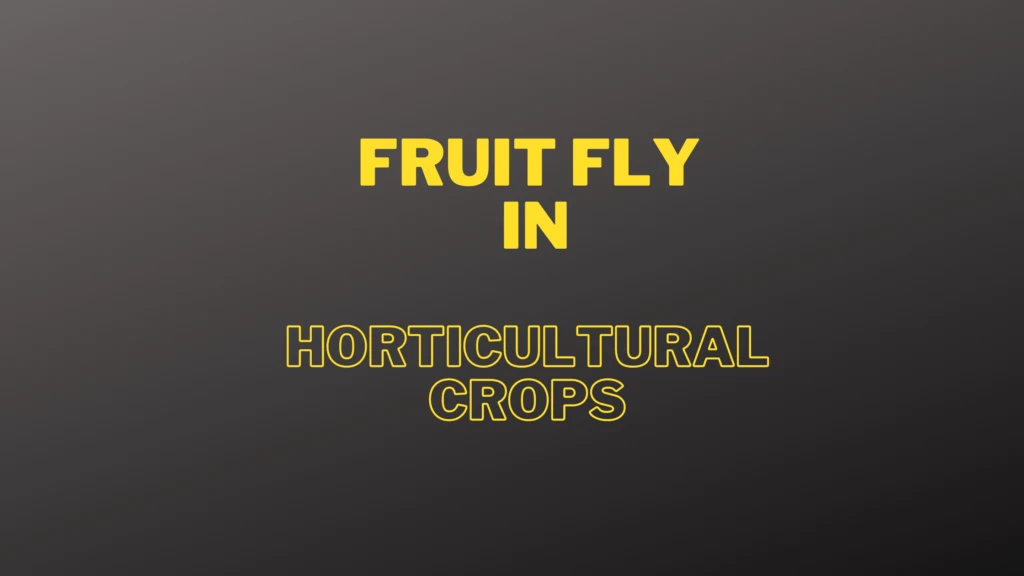The fruit fly is a big threat to various fruits and vegetables. There are several horticultural crops that are cultivated professionally, and the farmer gets a huge loss where fruit flies to attack. There are a lot of fruits and vegetables that are likely susceptible like citrus, mango, guava, bitter gourd, cucumber, etc. The citrus largest growing cultivar “Kinnow” in Pakistan is rejected sometimes as a whole shipment due to fruit fly detection and even in recurrent conditions, it may be banned. A similar case can be seen in mango export where a larger amount of mango shipment is rejected from Japan, the USA, and other countries if their pre-requisite conditions may not be followed by the farmer and exporter. So, it is very necessary to understand the importance of fruit fly. In this article, I will discuss the subsequent measures and steps in fruit fly control. The whole article will be discussed under the following outlines,
- Burn or bury the infected fruit
- Control with chemical measures
- Pheromone trap
- Anti-insect net
- High-density farming

Burn or bury the infected fruit
It is observed that the infected fruit part is not managed by the farmers. Farmers do not visit the field and supervise it when the fruit fly favorable season started. It is suggested that the grower should visit the field on daily basis. If it gets late to the farmer when fruits are compromised then it is suggested that fruits should be cut out and buried in two ft depths or burn the whole wasted pile of the infected commodity.
Establish the preliminary chemical measures
Fruit fly attack is favorable and gets started in March-April so it is suggested that insecticides of good companies should be sprayed within each week. It is suggested for the farmer does not wait for the fruit fly attack symptoms. It is very important for farmers to understand the lifecycle of a fruit fly. Female fruit fly needs only fruit where it can lay eggs inside and resultantly fruit will be looked like shriveled and misshapen. When farmers observe that fruit and then he cut this fruit and mistakenly drop in the vicinity through which larva came outside and spend its next lifespan under the soil and then it came out as an adult and attack the fields. It is suggested that different insecticides should be applied after the recommendation from other experienced growers and agricultural experts.
Application of pheromone traps
For the egg-laying process, the female fruit fly needs to mate with the male fruit fly for this purpose female to secrete out the “pheromone” and its smell reflects the male fruit fly. In this way, small plastic bottles are laid on each tree or near the plant vicinity with a chemical named “methyl eugenol” and in this way, the male fruit fly smells a similar secretion and gets trapped in the bottle. In this way male fruit fly can proceed to mate with the female and resultantly females can not lay eggs in fruits.
Use of anti-insect net
There is another trend that is going to start just like tunnel farming which is a complete and perfect method to avoid insects and pests of all kinds. The use of insecticides with repetition makes the insects make more resistant. The heavy use of chemical spray makes our food enriched with chemical poison, which is more destructive for human health, but if farmers use the anti-insect net to cover the whole crop then it will be easier to control any pest attack. It is also very important to mention that this structure and stuff is too much expensive that local farmers did not get it. So, it is necessary for the government to make the necessary changes to help the local farmer to meet the requirement.
Use of trap crop
It is observed that fruit flies did not spend too much time in any crop but for laying eggs it just uses very little time due to which the farmer did not observe fruit flies at all, but maize is its most likely crop where it stays for maximum time. So, using this strategy, it is also important to grow the maize crop around our actual crop and resultantly fruit fly will attack mostly on the maize fields.
Use of high density in a fruit orchard
It is a new growing trend of high-density farming, which is being started in mango, guava, and citrus. It is most recommended now with advanced techniques of irrigation and fertilizer will be helpful to maintain the crop. In high-density farming where plant height maintains at 6 ft and it is easier to spray the insecticide over a whole plant canopy area.
